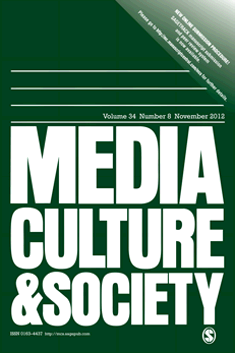Jenny Eklöf and I have been collaborating on a project during my HUMlab fellowship (2010-2012). Our study investigated how the biofuel controversy plays out in the Swedish press and Google search results. The results will be published in the journal Media, Culture & Society (mid of next year). The exact phrasing of the editor goes like this:
“It will be several issues, and certainly several months, before your piece is prepared for publication and the proofs sent on to you. Please do not contact us for a specified issue number and date until 5 months or so after this note of acceptance.”
Well, if you don’t want to wait that long please let us know and we’ll send you a copy!
That’s the abstract:
 What are the conditions for the public understanding of biofuels and how do the media shape these conditions under the influence of a new production of knowledge? This article investigates how the biofuel controversy plays out in the Swedish press and Google search engine results and analyses winners and losers in the tight attention economy of contemporary media. It describes different visibility strategies biofuel stakeholders employ in both media arenas, and identifies a form of technoscientific promotion that hybrid actors use to succeed in the day-to- day struggle for media attention. To conclude, it raises broader societal questions of the contemporary blurring of knowledge boundaries and the emergence of new information hierarchies and their biases. By understanding how contemporary media shape controversies, we can address the democratic potential of both mass media and science.
What are the conditions for the public understanding of biofuels and how do the media shape these conditions under the influence of a new production of knowledge? This article investigates how the biofuel controversy plays out in the Swedish press and Google search engine results and analyses winners and losers in the tight attention economy of contemporary media. It describes different visibility strategies biofuel stakeholders employ in both media arenas, and identifies a form of technoscientific promotion that hybrid actors use to succeed in the day-to- day struggle for media attention. To conclude, it raises broader societal questions of the contemporary blurring of knowledge boundaries and the emergence of new information hierarchies and their biases. By understanding how contemporary media shape controversies, we can address the democratic potential of both mass media and science.

